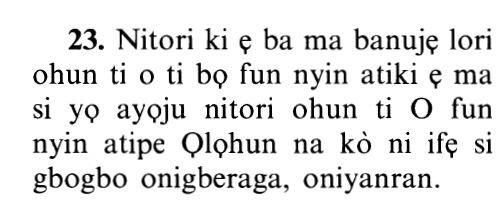57vs23
Select any filter and click on Go! to see results
لِكَيْلَا تَأْسَوْا عَلَى مَا فَاتَكُمْ وَلَا تَفْرَحُوا بِمَا آتَاكُمْ وَاللَّهُ لَا يُحِبُّ كُلَّ مُخْتَالٍ فَخُورٍ
Likayla tasaw AAala ma fatakum wala tafrahoo bima atakum waAllahu la yuhibbu kulla mukhtalin fakhoorin
Index Terms
Click to play
Yoruba Translation

Hausa Translation
Dõmin kada ku yi baƙin ciki a kan abin da ya kuɓuce muku, kuma kada ku yi mumar alfahari da abin da Ya bã ku. Kuma Allah bã Ya son dukkan mai tãƙama, mai alfahari.
Asbabu n-Nuzuul (Occasions of Revelation)
Ordering Patience and Gratitude
Allah said,
لِكَيْلَا تَأْسَوْا عَلَى مَا فَاتَكُمْ وَلَا تَفْرَحُوا بِمَا آتَاكُمْ ...
In order that you may not grieve at the things over that you fail to get, nor rejoice over that which has been given to you.
meaning, `We informed you of Our encompassing knowledge, recording all things before they occur and creating all things in due measure known to Us, so that you may know that what has met you would never have missed you and what has missed you would never have met you. Therefore, do not grieve for what you have missed of fortune, because had it been destined for you, you would have achieved it.'
It is also recited: مَا فَاتَكُمْ وَلَا تَفْرَحُوا بِمَا آتَاكُمْ (nor rejoice over that which came to you), meaning, come to you.
According to the recitation, آتَاكُمْ , it means (which has been given to you. Both meanings are related.
Allah says here, `do not boast before people about what Allah has favored you with, because it is not you who earned it by your efforts. Rather, all this came your way because Allah destined them for you and provided them for you as provisions. Therefore, do not use what Allah has granted you as a reason to boast and become arrogant with others.'
Allah's statement,
... وَاللَّهُ لَا يُحِبُّ كُلَّ مُخْتَالٍ فَخُورٍ ﴿٢٣﴾
And Allah likes not prideful boasters.
meaning, who acts arrogantly with other people.
Ikrimah commented by saying,
"Everyone of us feels happiness and grief. However, make your joy with gratitude and endure your grief with patience.''
وقوله تعالى " لكيلا تأسوا على ما فاتكم ولا تفرحوا بما آتاكم " أي أعلمناكم بتقدم علمنا وسبق كتابتنا للأشياء قبل كونها وتقديرنا الكائنات قبل وجودها لتعلموا أن ما أصابكم لم يكن ليخطئكم وما أخطأكم لم يكن ليصيبكم فلا تأسوا على ما فاتكم لأنه لو قدر شيء لكان " ولا تفرحوا بما آتاكم " أي جاءكم وتفسير " آتاكم " أي أعطاكم وكلاهما متلازم أي لا تفخروا على الناس بما أنعم الله به عليكم فإن ذلك ليس بسعيكم ولا كدكم وإنما هو عن قدر الله ورزقه لكم فلا تتخذوا نعم الله أشرا وبطرا تفخرون بها على الناس ولهذا قال تعالى" والله لا يحب كل مختال فخور " أي مختال في نفسه متكبر " فخور " أي على غيره وقال عكرمة ليس أحد إلا وهو يفرح ويحزن ولكن اجعلوا الفرح شكرا والحزن صبرا .
"لكيلا " كي ناصبة للفعل بمعنى أن أي أخبر تعالى بذلك لئلا "تأسوا" تحزنوا "على ما فاتكم ولا تفرحوا " فرح بطر بل فرح شكر على النعمة "بما آتاكم" بالمد أعطاكم وبالقصر جاءكم منه "والله لا يحب كل مختال" متكبر بما أوتي "فخور" به على الناس
أي حتى لا تحزنوا على ما فاتكم من الرزق , وذلك أنهم إذا علموا أن الرزق قد فرغ منه لم يأسوا على ما فاتهم منه . وعن ابن مسعود أن نبي الله صلى الله عليه وسلم قال : ( لا يجد أحدكم طعم الإيمان حتى يعلم أن ما أصابه لم يكن ليخطئه وما أخطأه لم يكن ليصيبه ) ثم قرأ " لكيلا تأسوا على ما فاتكم " إي كي لا تحزنوا على ما فاتكم من الدنيا فإنه لم يقدر لكم ولو قدر لكم لم يفتكم
I'raab - grammatical analysis of the Qur'an
«لِكَيْلا» اللام حرف جر وكي حرف مصدري ونصب ولا نافية «تَأْسَوْا» مضارع منصوب والواو فاعله والمصدر المؤول من كي والفعل في محل جر باللام والجار والمجرور متعلقان بفعل محذوف «عَلى ما» متعلقان بالفعل «فاتَكُمْ» ماض ومفعوله والفاعل مستتر والجملة صلة ، «وَلا تَفْرَحُوا» معطوف على ما قبله «بِما» متعلقان بالفعل «آتاكُمْ» ماض ومفعوله والجملة صلة «وَاللَّهُ» الواو حرف استئناف ولفظ الجلالة مبتدأ «لا» نافية «يُحِبُّ» مضارع «كُلَّ» مفعوله والفاعل مستتر «مُخْتالٍ» مضاف إليه «فَخُورٍ» صفة والجملة الفعلية خبر المبتدأ والجملة الاسمية استئنافية لا محل لها.
